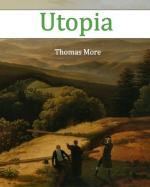|
This section contains 3,729 words (approx. 13 pages at 300 words per page) |

|
SOURCE: "More's Strategy of Naming in the Utopia," in Sixteenth Century Journal, Vol. XXII, No. 2, Summer, 1991, pp. 173-83.
In the following essay, Romm examines the significance of naming in the Utopia, arguing that More used irony and ambiguity in an effort to demonstrate the unreliability of language.
Like his fellow humanists, Thomas More was deeply interested in both philology and semiology, and in particular in the ways these two disciplines overlapped. For him Greek and Latin, or language in general, could at times become a kind of code, the meanings ofwhich could be extracted only imperfectly or not at all. Concerns over the relationship between language and meaning are particularly prominent in the Utopia, a work which opens with a "decoding" of a nonsensical quatrain, and which contains numerous proper names said on the one hand to derive from ancient Greek and on the other to be mere...
|
This section contains 3,729 words (approx. 13 pages at 300 words per page) |

|


